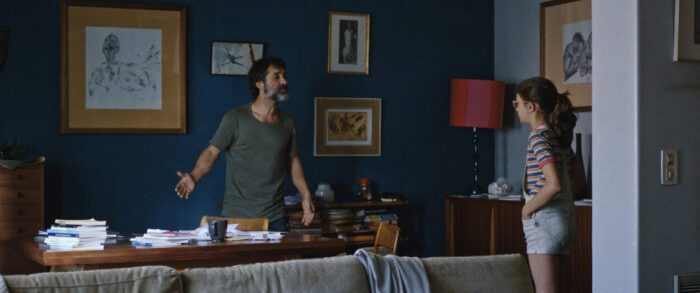In the Hundred Acre Wood, little Christopher Robin enjoyed the company of his imaginary animal friends, including tubby-little-cubby-all-stuffed-with-fluff Winnie the Pooh. Jimmy Stewart’s Elwood P. Dowd did too, in Harvey, as did Jake Gyllenhaal’s Donnie Darko. So too does the Portuguese coming-of-age dramedy Sadness and Joy in the Life of Giraffes, somewhere between the gentle innocence of A.A. Milne and other darker visions. In it, a ten-year-old girl, accompanied by her own imaginary teddy bear, ventures across the streets of Lisbon, meeting a curious gallery of friendly—and not-so-friendly—creatures along the way.
It’s worth mentioning that unlike the gentle, tiny Pooh, here the bear is a adult-size, foul-mouthed man in a droopy red bear costume, prone to expletive outbursts at any perceived slight or offense. The sight—and sound—of the unlikely-named Judy Garland (actor Tónan Quito, who in costume bears a resemblance to a thirtyish Adam Arkin), wearing a silly, simple bear suit, sucking on cigarettes, suffering mood swings, and spouting off his own suicidal tendencies, is just one of the many idiosyncrasies in director Tiago Guedes’ fairly-faithful film adaptation of renowned Portuguese playwright Tiago Gomes Rodrigues’ stageplay.
At its best, those idiosyncrasies make for a charming, delightfully quirky bildungsroman with a unique protagonist, the dictionary-addicted schoolgirl Giraffe (Maria Abreu), named so for her ungainly-for-her-age height. Giraffe lives at home with, as she calls him, “the man who is her father” (Miguel Borges): an over-extended, beleaguered, unemployed actor who (like any dad) can’t answer all of Giraffe’s questions. Giraffe’s nickname was given her by her late mother, as was her obvious intelligence and fondness for dictionaries.

At the film’s start, those complex family dynamics are presented in a swift, breezy opening sequence set as Giraffe prepares a school book report on the topic of “Sadness and Joy in the Life of Giraffes.” A clever use of simple stop-motion to animate paper cut-out elements of Giraffe’s report makes for a delightful point-of-entry to our character and her situation. Giraffe wants everyone to know and understand just how special these tall, benign, beautiful creatures of nature really are. The problem, though, is that her father can’t and won’t afford the subscription to the Discovery Channel Giraffe is just-so-adamantly-certain she needs for her report research.
The solution when your father can’t afford the cable subscription you are convinced you need? That is, if you are a 10-year-old girl with a book report due and an imaginary bear named Judy Garland for a best friend? It’s obvious: you set across Lisbon, with your foulmouthed, mood-swinging friend in tow, looking for the Prime Minister of Portugal, who can surely solve your problems with a stroke or three of his pen. Giraffe and Judy make for quite the unlikely duo. She is academic beyond her years, her every exchange an excess of scholarly formality; he is, despite his much-larger stature and much-older physical age, emotionally unstable, lashing out with all the immaturity of … well … a ten-year-old.
You get the sense that Judy Garland is a part of Giraffe she has buried along with her mother, a remnant of the emotional ten-year-old she might be if she allowed herself the anger of grieving. As she and Judy take to the streets of Lisbon to find the Prime Minister, the film becomes both a quirky coming-of-age story and a buddy-road comedy between two characters evincing nearly-opposite social traits. Giraffe is all nerdy academic inquiry, Judy all emotional outburst. The contrast makes for some gentle comedy as the two meet a black panther (not this kind or that, but a street punk in a thinly-disguised costume), the 19th-century writer Anton Chekhov, and more unlikely Alfacinhas, with Giraffe phone-recording each of their interactions for her “research.”

Eventually, the two find themselves at the steps of São Bento Palace, the seat of the Assembly of the Portuguese Republic and the residence of the Prime Minister. The fact that the Portugal of the moment is beset by a drastic economic crisis won’t deter the willful Giraffe, who demands not only of the Prime Minister that he grant her the cable subscription she needs, but that he also address all of the economic and social inequities faced by the country’s citizens.
In that it is adapted closely from a stageplay, Guedes’ film can at times feel too bound to dialogue. Of course, it needs the unique speech patterns of its two primary characters, the academic Giraffe and the profanity-prone Judy Garland, set in contrast to each other and everyone else they meet, for its comedic tone. And despite excellent, functional cinematography from Joao Lanca Morais, there is, aside from the few crude stop-motion notebook sequences, little that is expressly cinematic about the presentation. The film feels very much what it is: an adaptation of a stageplay, bound closely, perhaps a little too much so, to its source.
Sadness and Joy in the Life of Giraffes won, in fact, Winner of Best Adapted Screenplay at the 2020 Portuguese Film Academy’s Sophia Awards, among other international awards and acclaim. It’s a curious film: in many ways, given its youthful protagonist, clever conceit, and comic moments, a film that seems intended for the young. But its profanity makes it a film for more adult audiences. And in reality, the film’s themes are far more adult than a simple plot about a young girl and her imaginary animal friend might suggest. Growing up isn’t easy, the film makes clear. Neither is grieving. Losing something inside us sucks, and whether we are 10 or 100 or anywhere in between, our imaginations are one way in which we can reclaim vital parts of ourselves.
Directed and written by Tiago Guedes from the play of the same name by Tiago Rodrigues, Sadness and Joy in the Life of Giraffes streams March 24, 2023 on IndiePix Unlimited. 109 minutes, in Portuguese with English subtitles.



